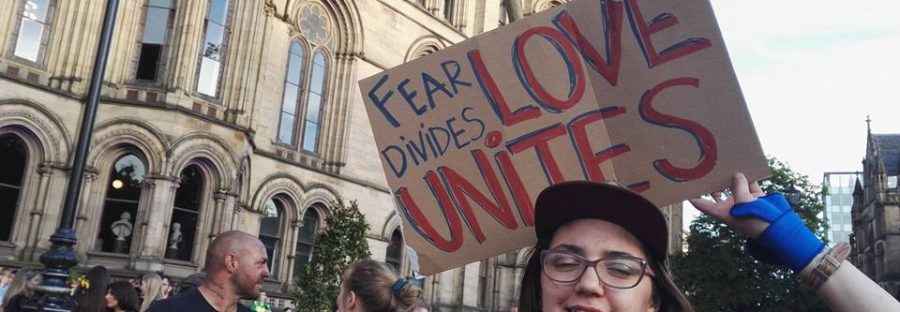Defiance and determination at Manchester’s Albert Square vigil
- Thousands come together in Albert's Square to remember the victims of last night's bomb attack
- Manchester Mayor, Andy Burnham was joined on the stage by the Home Secretary, Amber Rudd, the Labour leader, Jeremy Corbyn and the Speaker, John Bercow.
- 22 people were killed and 59 injured in the attack at Manchester Arena

As Albert Square filled for Tuesday’s vigil for the 22 victims of the Arena bomb attack, Councillor Pat Karney, the city centre chief, looked drained. He’d been called at 10:40pm – just ten minutes after the bomb exploded – and witnessed the full horror of the explosion. When he saw the scenes of children and teenagers covered in blood, injured – some dead – he knew this would be carnage.
“The purpose of today is to show that we care about the families and we recognise their unbearable pain,” he said.
“All Mancunians are thinking of them. This will be one of the biggest shows of solidarity in our city’s history.”
Paris, London, Brussels, Istanbul, Berlin, Nice.. now the name of Manchester can be added to the list of these awful atrocities: sudden, savage attacks that snatch away innocent lives indiscriminately.
At exactly 6pm, as news networks went live across Britain and around the world, Elgar’s Nimrod played out over the speakers and the doors of the Town Hall opened. People of all creeds and colour emerged and fanned out behind the microphones. Young, old, white, black, Sikh, Jew, Muslim, Christian – this was a vivid demonstration of the diversity and complexity of this city, united in its determination to open its doors to the world and welcome people in.

The music died away and a vast roar of applause in proud recognition of that simple yet powerful gesture swept across the sun-filled square. The list of dignitaries – metro Mayor Andy Burnham, Labour leader Jeremy Corbyn, Liberal Democrat leader Tim Farron, Commons speaker John Bercow – listened as the Lord Mayor of Manchester Eddy Newman spoke to the assembled crowd.
“People from Manchester from all the communities have come together to remember the victims of last night’s atrocity,” he said. “We will remember the victims forever.’
One of the city’s leading lights over the past four decades, Cir Richard Leese, was visibly upset as another wave of applause greeted this defiant message.
Then David Walker, the Bishop of Manchester, took the microphone.

“They are the few, but we are the many,” he said. ‘We are Manchester. We will stand together. This city is greater than the forces ranged against it. Love in the end is always stronger than hate. We will care for the victims now and in the future. Whether they are local or from far away, they are Manchester too. Our grief will not destroy us, but will re-make us.”
There was special applause and cheers reserved for the Chief Constable of Manchester, Ian Hopkins, as he paid tribute to the work of the police, emergency services, doctors and medical teams who had offered care and help throughout a traumatic night that Manchester will never forget.
“Today is a day we hoped we would never see,” said Mr Hopkins. “As your chief Constable, and as a father, I cannot begin to understand how anyone would carry out such an horrific act.”

With thousands in Albert Square and the Union flag at half mast, poet Tony Walsh, known as Longfellow, read his poem about Manchester called ‘This is the Place’; striking a tone of love for this city and defiance when times get tough that was greeted with whistles and shouts of recognition from the assembled crowd, before the Bishop of Manchester called for a minute’s silence to remember those who had died.
Then he leant to light a symbolic candle.
“This candle represents the unquenching light that darkness can never destroy,” he said.
And with that Mancunians began to head home, or to the gym, or to work … going about their normal lives exactly as they would have done less than 24 hours earlier – when so many lives were extinguished by the actions of a suicide bomber who was born in this city and who walked the same streets as them.


